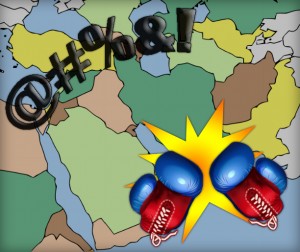
By: Chris Cummins
Staff Writer
The protests in Egypt, though seemingly started and run exclusively by grassroots protestors in the country, were in fact inspired by protests in Tunisia, a country that was home to similarly repressive conditions. After seeing the revolt in Tunisia, Egyptians took notice and began to demand their rights and freedoms, and in time, received them. In turn, Libyans, after seeing the successful revolts in Egypt, embarked on their own quest for independence, and are still struggling to succeed.
Now, Libya is in the midst of an upheaval, which if successful, as is most likely, will result in an ideological shift matched only by the Egyptian Revolution of 1952. Led by the charismatic Gamed Abdul Nasser, a military coup deposed the puppet king and ended British control of the country, and in turn changed the course of the Middle East. The revolution effectively marked the end of the 19th century idea of a European Empire, signaled the supremacy of American and Soviet interests over European desires, and marked the beginning of the patriarchal relationship America would share with Egypt, until the revolutions of 2011.
The unrest in Libya, as violent as it is momentous, represents a paradigm shift of the same type. Democracy has finally found a foothold in the Middle East, and it seems most likely the force of its allure will soon spark other revolutions in an already very volatile region. However, the dream of a republic has never come easily, and Libya has found itself an unfortunately bloody auguring of this change, with Muammar Gaddafi, Libya’s leader and one of the longest serving rulers in history, vowing to fight till the last man.
The protests, ostensibly intended to be non-violent, just as the Egyptian protests were, soon took a bloody turn, as Qaddafi turned military force against them in an outright attempt to crush the rebellion. However, large portions of the military refused to cooperate and sided with the protesters, in some cases fighting alongside them. Soon after these defections, Qaddafi hired large numbers of mercenaries from Africa in order to disperse the protesters, reportedly paying them an exorbitant amount of money and, among other things, a new car.
Soon after fighting peaked, with reports coming in of combat helicopters firing into crowds of protesters, troops sporadically firing into crowds, and on the part of both sides, coordinated armed warfare. The most alarming report, out of many of them, was that two fighter pilots who had been ordered to bomb groups of protestors defected, flew to Malta, and requested asylum, giving further evidence of the bloody outbreaks of violence plaguing the country.
The latest news reveals the essential fragmentation of Libya, as Qaddafi now controls only parts of the entire country, with the most recent rumors claiming that over 5,000 anti-protesters marched on Tripoli, a pro-Qaddafi stronghold due to his investment in the town, and engaged in what was essentially a battle with pro-Qaddafi supporters. Qaddafi, however, has made it clear he intends to hold on the country till the bitter end, claiming in a televised address that everyone who opposed him deserved to burn in hell, were vermin, and among other things, referred to himself in the third person.
Now, time will only tell as to what revolution will bring to Libya, and whether the success of Egypt, which as of yet has not been transferred into a stable government, can be replicated in their southern neighbor. However, it still looks, barring anything short of a miracle, as if a long road of violence lies ahead before Libyans can celebrate a democracy of their own.








